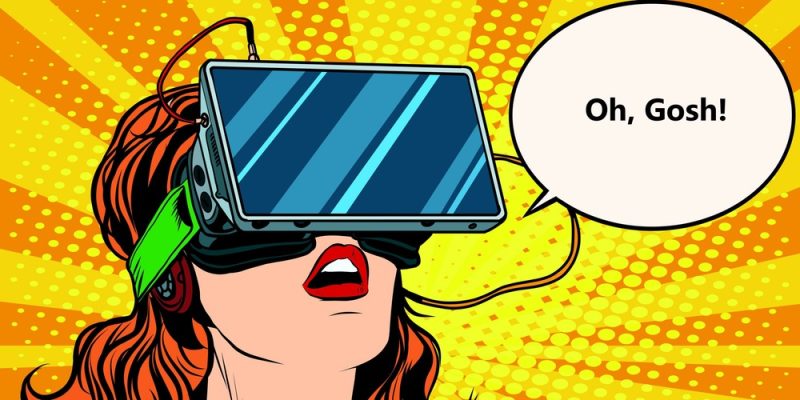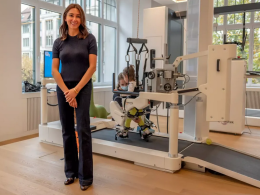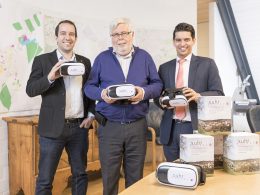The first Swiss VR cinema wearecinema.ch opened its doors in Zurich in July 2016. VR Room got the chance to talk to Corinne Oschwald, a co-founder of the pioneering VR Kino - We Are Cinema project, about the team's experience with this brand new cinema experience. What makes VR Kino Zurich so exciting, what challenges filmmakers face, unforeseen complications, and why a cinema where people are isolated from each other might even be more social than our traditional cinemas.
[/g1_lead]VR Room: Originally you wanted to develop a sports app when you became aware of VR glasses. Then it turned out on Facebook that many other people were also interested in the topic. How did the VR cinema that now exists come about?
Corinne Oschwald: Our first thought was to find out whether there was any demand at all. To find out, we first made the sale, so we had a date by which everything had to be ready. So we had a deadline that we were working towards. That means that by then we had looked for a location, bought the VR headsets and chairs, and organised all the processes. The location was a bit special, because, true to the sharing economy, we thought about which places would be underutilised on a Monday or Tuesday, for example. These were typically nightclubs.
Why do people go to the cinema for VR films, and what makes this experience so special?
I think, first and foremost, people want the Headset try it out. According to a survey we did, funnily enough, 70 per cent of the visitors don't own a headset and don't want to buy one. So a lot of people come to us who just want to try it out. But we are also exciting for people who are fans of new technologies and are always at the forefront. These are also the people who actually bring us forward, because they like to give us feedback and suggestions for improvement, just like the motto: "Hey, change this and that, then it will be better.
How do you choose the films that you finally show?
The goal is actually to have films in different categories so that we can do theme nights or something like that. Unfortunately, the content market is not yet as full as we would like. There are really few good VR films that you can show in a cinema setting. That's why we often specifically look for directors or start-ups to license the films directly.
And what topics do you cover so far?
Documentaries are a big topic for us at the moment, they are very well received. And of course horror, which is super effective in VR. The last category is artistic, experimental, you could call it that.
What kind of feedback do you get from visitors? Are there feedbacks that you say come frequently?
We have actively collected feedback. Interestingly, the quality, for example, is hardly criticised, although the field of VR film is still very young. The length of the films is understandably too short for some people, as most of them are only short films. But most people would come again as soon as new films are shown. Perhaps this is also due to the fact that none of them would buy a headset for home use.
You hear about motion sickness and similar complications from time to time. Were there any difficulties or reactions that you had to deal with acutely?
No, fortunately that has never happened. It did happen once, though, that two people touched each other while filming in the middle of a horror film *laughs* We had a popcorn-on-the-floor problem then. What some people also don't understand is that you have to turn on the swivel chairs we have in our cinema. So we implemented a text that visitors read and remark, " Ah! I kind of have to turn there!" But motion sickness has never been a problem.
Steven Spielberg once mentioned, that VR is a dangerous medium for himThe way films are made, the way they are conceived, has to be completely redefined. As we have also found, you have to guide the audience much more so that they also look in the right direction.
In my opinion, this is actually a very interesting new point for the filmmaker. He can actually show one action actively, and one action next to it passively, and thus give the audience the opportunity to choose where they want to look. We also often notice that after a screening there is a lot of discussion, the visitors take off their headsets and start talking about where they looked, what they saw. The whole thing actually makes the cinema performance even more social than a normal performance where everyone sees the same thing.
Looking at the content now, in which direction do you think VR films should develop, what would you like to see in the future?
Action, action films! *laughs* It's a good mix between horror, which is maybe a bit too extreme for many viewers, and documentaries, which are a bit too long for other viewers. I think action would be the perfect mix for us.
Finally, are there any particular VR films that you can recommend to us?
A classic is Sonar. You're flying through space in a capsule, when suddenly - dot, dot, dot...I won't tell you any more.
Thank you very much for the interview!









